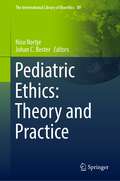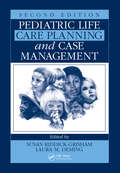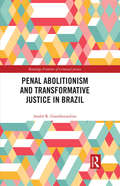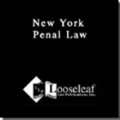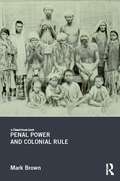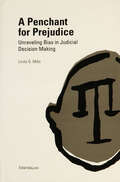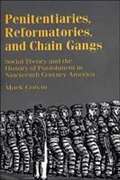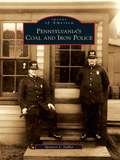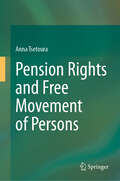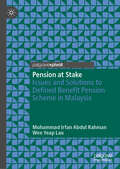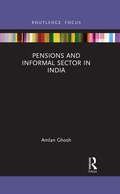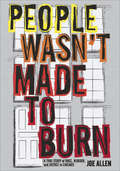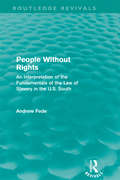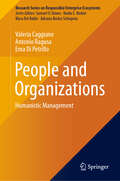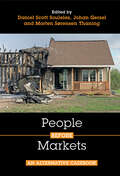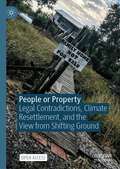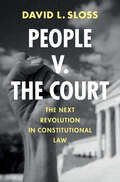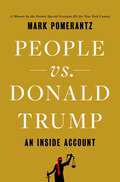- Table View
- List View
Pediatric Bioethics
by Geoffrey MillerThis volume offers a theoretical and practical overview of the ethics of pediatric medicine. It serves as a fundamental handbook and resource for pediatricians, nurses, residents in training, graduate students, and practitioners of ethics and healthcare policy. Written by a team of leading experts, Pediatric Bioethics addresses those difficult ethical questions concerning the clinical and academic practice of pediatrics, including an approach to recognizing boundaries when confronted with issues such as end of life care, life-sustaining treatment, extreme prematurity, pharmacotherapy, and research. Thorny topics such as what constitutes best interests, personhood, or distributive justice and public health concerns such as immunization and newborn genetic screening are also addressed.
Pediatric Ethics: Theory and Practice (The International Library of Bioethics #89)
by Nico Nortjé Johan C. BesterThis book assists health care providers to understand the specific interplay of the roles and relationships currently forming the debates in pediatric clinical ethics. It builds on the fact that, unlike adult medical ethics, pediatric ethics begins within an acutely and powerfully experienced dynamic of patient-family-state-physician relationship. The book provides a unique perspective as it interacts with established approaches as well as recent developments in pediatric ethics theory, and then explores these developments further through cases. The book first focuses on setting the stage by introducing a theoretical framework and elaborating how pediatric ethics differ from non-pediatric ethics. It approaches different theoretical frameworks in a critical manner drawing on their strengths and weaknesses. It helps the reader in developing an ability to engage in ethical reasoning and moral deliberation in order to focus on the wellbeing of the child as the main participant in the ethical deliberation, as well as to be able to identify the child’s moral claims. The second section of the book focuses on the practical application of these theoretical frameworks and discusses specific areas pertaining to decision-making. These are: the critically ill child, new and enduring ethical controversies, and social justice at large, the latter of which includes looking at the child’s place in society, access to healthcare, social determinants of health, and vaccinations. With the dynamic changes and challenges pediatric care faces across the globe, as well as the changing face of new technologies, no professional working in the field of pediatrics can afford not to take due note of this resource.
Pediatric Homicide: Medical Investigation
by Karen GriestPediatric homicide investigations are clouded by a number of factors, not the least of which is a lack of straightforward resources. The cause of death in infants and children is often subtle and difficult to establish. Designed for quick access, Pediatric Homicide: Medical Investigation provides an invaluable resource for medical examiners, police
Pediatric Life Care Planning and Case Management
by Kate M. Grady Andrew M. Severn Paul R. EldridgePediatric Life Care Planning and Case Management provides a comprehensive and unique reference that goes beyond the clinical discussion to include legal and financial aspects, life expectancy data, and assistive technology. It also includes case samples of actual plans related to specific conditions. The book is divided into five parts: Normal Grow
Penal Abolitionism and Transformative Justice in Brazil (Routledge Frontiers of Criminal Justice)
by Andre R. GiamberardinoPenal Abolitionism and Transformative Justice in Brazil discusses how penal abolitionism provides fundamental theoretical bases and practical references for the construction of a transformative justice in Brazil, supporting the claim that justice is a socially constructed conception and that victims do not unanimously stand for punishment. The book explores how the active participation of the protagonists of a conflict in a face-to-face negotiation of symbolic reparation, can produce a sense of justice without the need to punish or impose suffering on anyone. Mapping the ways that restorative justice in Brazil has distanced itself from the potential of transformative justice, to the extent that it fails to politicize the conflict and give voice to victims, the book shows how it has resulted in becoming just a new version of penal alternatives with correctionalist content. Moving away from traditional criminal justice language and also from conservative approaches to restorative justice, the author argues that the communicative potential of the transformative kind of redress can be dissociated from the unproved assumption that legal punishment is essential or even likely to achieve justice or deterrence. The arguments are grounded in the Brazilian reality, where life is marked by deep social inequalities and a high level of police violence. By providing a review of the literature on restorative justice, transformative justice, and abolitionism, the book contextualizes the abolitionist debate in Brazil and its history in the 19th century. Penal Abolitionism and Transformative Justice in Brazil is important reading for students and scholars who study punishment and penal abolitionism, to think about what it is possible to do in societies so deeply marked by social injustice and a history of oppression.
Penal Law Of New York State
by Looseleaf Law Publications Inc. StaffNYS Certified Law Book which is annually updated for accuracy.
Penal Law of the State of New York
by Looseleaf Law PublicationsThis book contains the text of the provisions of Penal Law of the State of New York.
Penal Power and Colonial Rule
by Mark BrownThis book provides an account of the distinctive way in which penal power developed outside the metropolitan centre. Proposing a radical revision of the Foucauldian thesis that criminological knowledge emerged in the service of a new form of power – discipline – that had inserted itself into the very centre of punishment, it argues that Foucault’s alignment of sovereign, disciplinary and governmental power will need to be reread and rebalanced to account for its operation in the colonial sphere. In particular it proposes that colonial penal power in India is best understood as a central element of a liberal colonial governmentality. To give an account of the emergence of this colonial form of penal power that was distinct from its metropolitan counterpart, this book analyses the British experience in India from the 1820s to the early 1920s. It provides a genealogy of both civil and military spheres of government, illustrating how knowledge of marginal and criminal social orders was tied in crucial ways to the demands of a colonial rule that was neither monolithic nor necessarily coherent. The analysis charts the emergence of a liberal colonial governmentality where power was almost exclusively framed in terms of sovereignty and security and where disciplinary strategies were given only limited and equivocal attention. Drawing on post-colonial theory, Penal Power and Colonial Rule opens up a new and unduly neglected area of research. An insightful and original exploration of theory and history, this book will appeal to students and scholars of Law, Criminology, History and Post-colonial Studies.
Penchant for Prejudice: Unraveling Bias in Judicial Decision-Making
by Linda Gayle MillsA Penchant for Prejudice combines a detailed empirical study of the decision-making practices of judges with a sophisticated theoretical argument which exposes contemporary myths about judging and suggests methods of incorporating the inevitable bias that is detected in this and other studies. Based on a unique study of the decisions of Social Security judges, the book challenges the meaning of judicial impartiality. Linda G. Mills finds that, in practice, bias is a consistent dimension of what is considered "impartial" decision-making. The results reveal that impartiality as the legal system now defines it, is itself a form of bias, and that a historically and contextually sensitive definition of bias, one which takes account of the communities and cultures that come to be judged in the legal system, must overcome the modern dualistic notion of imparitality as the exclusion of bias in order to respond to needs of the diversity of applicants and the judges who adjudicate their claims. According to Mills, the judicial bias she found reflected in her study seems not only to essentialize and stereotype applicants but also prevents judges from engaging vulnerable claimants in a way that the legal process positively demands. A Penchant for Prejudice will be of interest to students and scholars of law, judicial decisionmaking, and discrimination. Linda G. Mills is Assistant Professor of Social Welfare and Law, University of California, Los Angeles.
Penitentiaries, Reformatories, and Chain Gangs
by Mark ColvinThis book presents information on both the historical development of punishments in the US and the theoretical interpretations of these developments. Colvin (sociology, George Mason U.) examines rival theories of the transformation of punishment systems and penal practices; the rise of penitentiaries in the Northeast; the changing perception and punishments of female offenders through the last 150 years; the transformation of criminal punishment in the South; and today's corrections system.
Pennsylvania's Coal and Iron Police (Images of America)
by Spencer J. SadlerPennsylvania's Coal and Iron Police ruled small patch towns and industrial cities for their coal and iron company bosses from 1865 to 1931. Armed with a gun and badge and backed by state legislation, the members of the private police force were granted power in a practically unspecified jurisdiction. Set in Pennsylvania's anthracite and bituminous regions, including Luzerne, Schuylkill, Westmoreland, Beaver, Somerset, and Indiana Counties, at a time when labor disputes were deadly, the officers are the story behind American labor history's high-profile events and attention-grabbing headlines. Paid to protect company property, their duties varied but unfortunately often resulted in strikebreaking, intimidation, and violence.
Pension Games
by Chicago Tribune Staff Wgn-Tv StaffChicago Mayor Rahm Emanuel, Illinois Governor Pat Quinn, and former Chicago mayor Richard M. Daley have something in common that could easily become each of their undoing: Chicago's severely underfunded public pension system. Pension Games is a series of investigative reports on the broken, corrupt system that provides retirement payments to Chicago's many public service workers. Beginning in 2010, the Tribune has tracked this crisis from its birth to its current state of crisis roiling political and business figures from Cook County to Springfield. Through its in-depth research and watchdog reporting, the Chicago Tribune has exposed mismanagement and corruption within the pension system by public officials past and present.Pension Games is a hard-hitting expose that reveals how former mayor Richard M. Daley used pension funds to make political deals and give oversized pensions to all sorts of city workers--himself included. By looking at the history of the pension system, the nature of the laws themselves, and a trove of primary materials, investigative journalists have uncovered rampant corruption and uncorrected failures that have led to an attempt at state-wide pension reform.This book clearly details the exact makeup of arcane pension laws that have allowed this crisis to cripple public finances, while never before examined primary documents and pension records reveal the complex nature of this problem. Pension Games helps explain the origins, cause, and nature of the issues afflicting the residents of Chicago and Illinois in straightforward, aboveboard terms, making the convoluted ins and outs of pensions quite accessible. Complementing this analysis of public records and finances are profiles and case studies of specific individuals, bringing the results of the system's misuse and abuse to life.As the Tribune continued to investigate the issues at the heart of the pension problem, it eventually triggered an official look into pension reform in Illinois, as well as a new federal investigation of several union officials' pensions in Chicago. The immediate and long-term crises posed by a pension system unhinged are at the forefront of public officials' minds, not the least of whom include Mayor Rahm Emanuel and Governor Pat Quinn. If they cannot reform these public finance systems, it may easily be their own political careers that will pay the price. What's more is that many of any convictions or revelations that come out of the reformation process and federal investigation may taint if not undo the largely positive legacy of Richard M. Daley.For the first time ever, one book examines the breadth and depth of the pension problem in Illinois and Chicago, and it is a problem that will only continue to be in the news until major reforms can be enacted. Even after, the fallout from decades of pension abuse will not only affect the Midwest's largest hub of political and economic activity in Chicago and Illinois, but it will have major repercussions for cities and states across the nation struggling with the same issues.
Pension Regimes and Saving
by G. A. Mackenzie Philip Gerson Alfredo Cuevas#"September 1997. "#Includes bibliographical references (p. ).
Pension Rights and Free Movement of Persons
by Anna TsetouraThis book provides answers to crucial questions such as which pension schemes fall under the scope of Regulation 883/2004 on the coordination of social security systems, and which pensions constitute social security benefits to be coordinated. In order to answer these and other questions, the book also draws on supplementary pension schemes and examines the relationship between Regulation 883/2004 and Directive 2014/50 on supplementary pension rights. The provisions of the Regulation are analyzed, along with the interpretation provided by the Court of Justice of the European Union and individual Member States&’ practices. Specifically, the jurisprudence supports a range of findings which indicate the social features that a given pension system needs to have in order to be regarded as having social goals pertaining to social security. Further, the book explores the complications arising from the coordination of fundamentally different pension systems (pay-as-you-go and funded) on the basis of the new provisions of the Regulation on funded schemes. Certain techniques in order to protect the mobility of pension rights are suggested. In turn, the book examines the pension loss a moving pensioner might face due to the anti-overlapping rules. The case law regarding overlapping is reviewed in order to reveal the complexities deriving from anti-overlapping rules. Explanatory remarks are provided, and examples are presented so as to show the practical impacts of the current application of anti-overlapping rules on pension rights. Last but not least, it recommends a different interpretative approach to anti-overlapping rules, with the aim of ensuring that pension rights are not downgraded. The book addresses scholars and practitioners with an interest in pensions, social security and EU law, offering them in-depth but straightforward insights into the technical cross-border aspects of pensions.
Pension at Stake: Issues and Solutions to Defined Benefit Pension Scheme in Malaysia
by Wee Yeap Lau Muhammad Irfan Abdul RahmanThis book focuses on the Defined Benefit (DB) pension scheme for pensionable civil servants in Malaysia, as a result of the rapidly rising pattern of pension costs for public servants in the country. In doing so, the book explores various issues on the defined benefit pension fund that the Malaysian Government currently confronts. Chapter one provides an overview of the pension system in the country, covering only the civil service pension fund managed by the Retirement Fund (Incorporated), better known as KWAP. It also discusses the issues and challenges the pension system and pensioners face. Chapter two reviews the past studies, sets up empirical models and examines which are the determinants of pension cost. Chapter three examines the asset allocation and performance of the KWAP pension fund from the last 13 years since the Ministry of Finance established it as part of the pension reform. Based on the available pension assets and liabilities data, Chapter Four outlines the steps and makes the 10-year forecast to ascertain whether the pension fund will be underfunded or not in the future. Chapter five examines whether the pension fund is sustainable in the long run based on the four parameters using scenario-based simulation. In order to solve this problem, especially the longevity risk, Chapter six proposes issuing longevity bonds by the authority to mitigate the longevity risk faced by the KWAP pension fund. Put together, the book is an interesting compilation of facts, analysis and insights from this hotly debated issue the current government faces. It serves as a reference for the financial market industry, regulators, market practitioners, analysts, researchers, government authorities and universities.
Pensions and Informal Sector in India
by Amlan GhoshThis book deals with the pension of uncovered people in India, the informal or unorganized sector workers who contribute more than fifty percent of India’s total output. Until recently, these workers don’t get any old age security when they retire unlike those from the organized sector workers such as govt. employees or corporates. This book offers insights on the pension system of the informal sector in India. The book is the outcome of field research of two years and the field research was conducted on MSME sector (a sub sector of unorganised sector) which provides the knowledge about the present state of the unorganised sector workers in MSMEs, their financial condition and stress, their work participation, their awareness level of old age financial security or pension and their financial behaviour regarding pension savings in India. This book empirically demonstrates a relationship between financial literacy and willingness to save for retirement benefits among the informal sector workers in India. Access to banking also improves the probability of retirement savings along with the gender and education. By reading this book, readers can understand the demographic change India is going to witness within the next thirty years and its challenges to meet the longevity risk of these workers.
People Like Her: A Novel
by Ellery Lloyd"Beyond being a brilliant skewering of social media and influencer culture, People Like Her is, quite simply, a damn good thriller . . . . The novel reads like Gone Girl on steroids in all the best ways.”— BookReporter“Breathlessly fast, brilliantly original. Bravo, Ellery Lloyd!”—Clare Mackintosh, New York Times bestselling author of After the EndFrom the New York Times bestselling author of The Club, a razor-sharp, wickedly smart suspense debut about an ambitious influencer mom whose soaring success threatens her marriage, her morals, and her family’s safety.Followed by Millions, Watched by OneTo her adoring fans, Emmy Jackson, aka @the_mamabare, is the honest “Instamum” who always tells it like it is. To her skeptical husband, a washed-up novelist who knows just how creative Emmy can be with the truth, she is a breadwinning powerhouse chillingly brilliant at monetizing the intimate details of their family life.To one of Emmy’s dangerously obsessive followers, she’s the woman that has everything—but deserves none of it. As Emmy’s marriage begins to crack under the strain of her growing success and her moral compass veers wildly off course, the more vulnerable she becomes to a very real danger circling ever closer to her family.In this deeply addictive tale of psychological suspense, Ellery Lloyd raises important questions about technology, social media celebrity, and the way we live today. Probing the dark side of influencer culture and the perils of parenting online, People Like Her explores our desperate need to be seen and the lengths we’ll go to be liked by strangers. It asks what—and who—we sacrifice when make our private lives public, and ultimately lose control of who we let in. . . .
People Love Dead Jews: Reports From A Haunted Present
by Dara HornA startling and profound exploration of how Jewish history is exploited to comfort the living. Renowned and beloved as a prizewinning novelist, Dara Horn has also been publishing penetrating essays since she was a teenager. Often asked by major publications to write on subjects related to Jewish culture—and increasingly in response to a recent wave of deadly antisemitic attacks—Horn was troubled to realize what all of these assignments had in common: she was being asked to write about dead Jews, never about living ones. In these essays, Horn reflects on subjects as far-flung as the international veneration of Anne Frank, the mythology that Jewish family names were changed at Ellis Island, the blockbuster traveling exhibition Auschwitz, the marketing of the Jewish history of Harbin, China, and the little-known life of the "righteous Gentile" Varian Fry. Throughout, she challenges us to confront the reasons why there might be so much fascination with Jewish deaths, and so little respect for Jewish lives unfolding in the present. Horn draws upon her travels, her research, and also her own family life—trying to explain Shakespeare’s Shylock to a curious ten-year-old, her anger when swastikas are drawn on desks in her children’s school, the profound perspective offered by traditional religious practice and study—to assert the vitality, complexity, and depth of Jewish life against an antisemitism that, far from being disarmed by the mantra of "Never forget," is on the rise. As Horn explores the (not so) shocking attacks on the American Jewish community in recent years, she reveals the subtler dehumanization built into the public piety that surrounds the Jewish past—making the radical argument that the benign reverence we give to past horrors is itself a profound affront to human dignity.
People Wasn't Made to Burn: A True Story of Housing, Race, and Murder in Chicago
by Joe AllenThis story of a grief-stricken man&’s murder of a landlord is &“nothing less than a reinvention of the true crime genre&” (The Nation). In 1947, James Hickman shot and killed the landlord he believed was responsible for a tragic fire that took the lives of four of his children on Chicago&’s West Side. But a vibrant defense campaign, exposing the working poverty and racism that led to his crime, helped win Hickman&’s freedom. With a true-crime writer&’s eye for suspense and a historian&’s depth of knowledge, Joe Allen unearths the compelling story of a campaign that stood up to Jim Crow well before the modern civil rights movement had even begun. Those who witnessed the Great Recession&’s deteriorating housing conditions and accelerating foreclosure crisis will discover a hauntingly similar set of circumstances contributing to the Hickman case—giving this little-remembered story profound relevance in today&’s political atmosphere and the tension surrounding rampant wealth and racial inequality. &“[A] remarkable book . . . a horrific portrait of the inhumane conditions in which blacks were forced to live in post-WWII Chicago.&” —Chicago Tribune
People Without Rights: An Interpretation of the Fundamentals of the Law of Slavery in the U.S. South (Routledge Revivals)
by Andrew FedeFirst published in September 1992, the book traces the nature and development of the fundamental legal relationships among slaves, masters, and third parties. It shows how the colonial and antebellum Southern judges and legislators accommodated slavery’s social relationships into the common law, and how slave law evolved in different states over time in response to social political, economic, and intellectual developments. The book states that the law of slavery in the US South treated slaves both as people and property. It reconciles this apparent contradiction by demonstrating that slaves were defined in the law as items of human property without any legal rights. When the lawmakers recognized slaves as people, they burdened slaves with added legal duties and disabilities. This epitomized in legal terms slavery’s oppressive social relationships. The book also illustrates how cases in which the lawmakers recognized slaves as people legitimized slavery’s inhumanity. References in the law to the legal humanity of people held as slaves are shown to be rhetorical devices and cruel ironies that regulated the relative rights of the slaves’ owners and other free people that were embodied in people held as slaves. Thus, it is argued that it never makes sense to think of slave legal rights. This was so even when the lawmakers regulated the individual masters’ rights to treat their slaves as they wished. These regulations advanced policies that the lawmakers perceived to be in the public interest within the context of a slave society.
People and Organizations: Humanistic Management (Research Series on Responsible Enterprise Ecosystems)
by Valeria Caggiano Antonio Ragusa Ema Di PetrilloIn today's world, where the pursuit of profit often takes precedence over the well-being of people and the planet, humanistic management offers a refreshing and much-needed alternative. This book explores the concept of humanistic management as a model for organisations that emphasises individual freedom, dignity and ethics, and presents practical approaches and challenges for implementing it. The author provides a comprehensive overview of the humanistic management approach, exploring its values and principles, as well as the benefits it can bring to companies, employees and society as a whole. Through a combination of theory and case studies, the book offers insights into the cultural and behavioural changes required for organisations to adopt a humanistic approach to management. The book illustrates didactic experiments, social and territorial conjunctures, intellectual and moral postures. Whether you are a business leader, manager or management student, this book is an essential guide for anyone who wants to create a more sustainable and socially responsible organisation. With its clear and insightful analysis of humanistic management, it is sure to inspire and inform readers of all backgrounds and lifestyles.
People before Markets: An Alternative Casebook
by Daniel Scott Souleles Johan Gersel Morten Sørensen ThaningThis innovative volume presents twenty comparative case studies of important global questions, such as 'Where should our food come from?' 'What should we do about climate change?' and 'Where should innovation come from?' A variety of solutions are proposed and compared, including market-based, economic, and neoliberal approaches, as well as those determined by humane values and ethical and socially responsible perspectives. Drawing on original research, its chapters show that more responsible solutions are very often both more effective and better aligned with human values. Providing an important counterpoint to the standard capitalist thinking propounded in business school education, People Before Markets reveals the problematic assumptions of incumbent frameworks for solving global problems and inspires the next generation of business and social science students to pursue more effective and human-centered solutions.
People or Property: Legal Contradictions, Climate Resettlement, and the View from Shifting Ground
by Alessandra Jerolleman Elizabeth Marino Nathan Jessee Liz Koslov Chantel Comardelle Melissa Villarreal Daniel de Vries Simon MandaThis open access book explores the intersection of property law, relocation, and resettlement processes in the United States and among communities that grapple with migration as an adaptation strategy. As communities face the prospect of relocating because of rising seas, policy makers, disaster specialists, and community leaders are scrambling to understand what adaptation pathways are legally possible. While in its ideal application, law functions blindly and without variation, the authors find that legal contradictions come to bear on resettlement processes and place certain communities further in harm’s way. This book will unearth these contradictions in order to understand why successful community-based resettlement has presented such a challenge to communities that are experiencing increasing land deterioration as a result of climate change.
People v. The Court: The Next Revolution in Constitutional Law
by David L. SlossThe Constitution divides power between the government and We the People. It grants We the People an affirmative, collective right to exercise control over the government through our elected representatives. The Supreme Court has abused its power of judicial review and subverted popular control of the government. The Court's doctrine divides constitutional law into rights issues and structural issues. Structural constitutional doctrine ignores the Constitution's division of power between the government and We the People. The Court's rights doctrines fail to recognize that the Constitution grants the People an affirmative, collective right to exercise control over our government. People v. The Court presents an indictment of the Supreme Court's constitutional doctrine. It also provides a set of proposals for revolutionary changes in the practice of judicial review that are designed to enable We the People to reclaim our rightful place as sovereigns in a democratic, constitutional order.
People vs. Donald Trump: An Inside Account
by Mark PomerantzPeople vs. Donald Trump is a fascinating inside account of the attempt to prosecute former president Donald Trump, written by one of the lawyers who worked on the case and resigned in protest when Manhattan’s district attorney refused to act. Mark Pomerantz was a retired lawyer living a calm suburban life when he accepted an unexpected offer to join the staff of the district attorney of New York County in February 2021 to work on the investigation of former president Donald Trump. <p><p>The Manhattan DA was interested in Pomerantz because he brought vast experience in litigating white collar and organized crime cases, having worked as a federal prosecutor and a criminal defense attorney for decades. Pomerantz had prosecuted and defended cases involving murder, drug trafficking, political corruption, tax evasion, and financial fraud. His clients had included governors and senators, business leaders, financial institutions, and also gangsters and murderers. Over the next year, Pomerantz investigated the world of Donald Trump and the Trump Organization. He interviewed potential witnesses, scrutinized financial records, and learned everything he could about Trump’s business practices. The investigation led him to believe that the former president’s approach to business had much in common with the business practices of another well-known public figure—former mob boss John J. Gotti. Ultimately, Pomerantz gathered enough evidence to support the view—held by many of his colleagues on the case, including former Manhattan district attorney Cyrus Vance Jr.—that former president Donald Trump should be indicted for a number of financial crimes. But that indictment never happened. <p><p>This book explains why. Pomerantz’s work ultimately led to the indictment of the Trump Organization and Allen Weisselberg, the chief financial officer of the Trump Organization, who pleaded guilty to tax fraud. But that indictment was merely the prelude to a larger criminal case that Pomerantz urged the Manhattan DA, Alvin Bragg, to bring against Donald Trump. When the DA refused to authorize that prosecution, Pomerantz and his colleague Carey Dunne resigned. Aspects of the case Pomerantz wanted to bring are currently being pursued against Trump by the attorney general of New York State in a civil fraud case that does not involve criminal penalties. In People vs. Donald Trump, Pomerantz tells the story of his unprecedented investigation, why he believes Donald Trump should be prosecuted, and what we can learn about the nature of justice in America from this extraordinary case. Pomerantz draws from a lifetime of legal experience to tell a devastating and frequently entertaining story of how prosecutors think, how criminals act, and how our justice system works—and sometimes doesn’t work. Pomerantz has written a cautionary tale that illuminates the challenges of prosecuting Donald Trump, why Trump manages to dance between the raindrops of accountability, and how others might bring him to justice. <p> <b>New York Times Bestseller</b>

